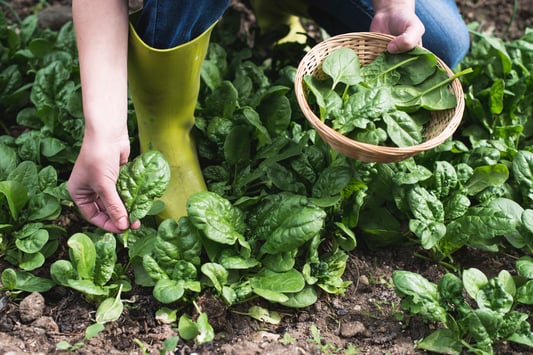Are you looking for ways to boost your overall health while also eating something delicious that also is beneficial to the planet? Look no further than enjoying some wonderful and fresh spinach to celebrate National Spinach Day on March 26! It seems as if everything has its own holiday, but including spinach in your everyday life will have you reaping the benefits for more than just one day. Spinach is a leafy green vegetable that originated in Persia and was brought over to the US around 1806. It is a part of the Amaranthaceae (Amaranth) family and is related to beets and quinoa.
Spinach is sometimes referred to as a “superfood” because it is an extremely nutrient-rich vegetable with a plethora of health benefits. In addition to being an excellent source of fiber, it’s loaded with vitamins and minerals such as:
● Vitamin A which is important for eye health and boosts our immune functions
● Vitamin C which promotes skin health and strengthens our immune system
● Vitamin K1 which is essential for blood clotting
● Folic acid which is vital during pregnancy because it helps organs and tissues to form
● Iron which helps with energy levels and keeps our blood healthy
● Calcium which strengthens our bones and teeth
● Potassium, magnesium, and vitamins B6, B9 and E
Spinach also contains antioxidants that decrease your risk of cancer, diabetes and premature aging. It can also help moderate blood pressure.
Now, after reading all of that, how could you not want to add some spinach to your diet? You can get it at the grocery store, or you can try your hand at gardening and grow your own leafy greens. Spinach is a cold weather crop that does best in the spring and fall and can even be planted in a pot. If you live in the Eagle River watershed, you can begin growing your own spinach outside now as long as you protect the leaves from freezing. Spinach comes in 3 different varieties (savoy, semi-savoy and flat leaf) so pick your favorite.
 Picking Spinach from a home garden.
Picking Spinach from a home garden.
One of the easiest ways to incorporate spinach into your diet is to add small amounts to dishes that you already make. You can add it into pastas, omelets, sandwiches or as the base of a salad. If you are weary about the taste, you can blend some into a smoothie and the only difference you’ll notice is a slight change in the color. Challenge yourself to incorporate some delicious spinach into a few of your meals this week.
Not only is eating spinach beneficial for our own health, eating spinach and other veggies is an easy way to reduce your carbon footprint and be more sustainable. Meat and dairy production are associated with higher emissions of greenhouses gases and require more land and water to produce than vegetables for the same amount of food. Eating a plant-heavy diet can benefit your health and the planet’s health.
As individuals, it can feel overwhelming to figure out what part we can play in reducing our own carbon footprint, but adding more plant-based foods into our diet is a great place to start. Another way to help out is to reduce food waste. Food waste is another large contributor to greenhouse gas emissions through the production, transportation and then ultimately the rotting of food in landfills. Freezing food before it goes bad, eating leftovers, and buying less food in the first place are all great ways to reduce food waste. Composting the food that can no longer be eaten is even better.
How will you eat your veggies this week?







